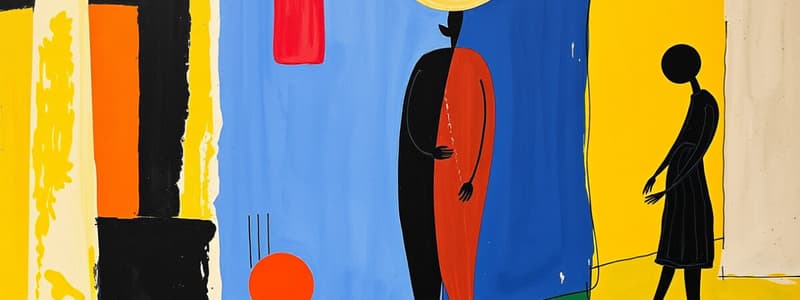Podcast
Questions and Answers
What is neoclassicism?
What is neoclassicism?
The revival of a classical style or treatment in art, literature, architecture, or music.
Which of the following are characteristics of early neoclassical writing? (Select all that apply)
Which of the following are characteristics of early neoclassical writing? (Select all that apply)
- Emphasized appropriateness and 'proper' subject matter (correct)
- Believed humans are flawed (correct)
- Valued logic, tradition, and balance (correct)
- Promoted chaos and complexity
What did neoclassical poets seek in their writing?
What did neoclassical poets seek in their writing?
Simple and clear structure.
What is Calvinism?
What is Calvinism?
How might Puritanism be considered a similar movement to the Reformation?
How might Puritanism be considered a similar movement to the Reformation?
What do the lines 'Oh! could I lose all father, now! for why, Will man lament the state he should envy?' from Jonson's 'On My First Son' express?
What do the lines 'Oh! could I lose all father, now! for why, Will man lament the state he should envy?' from Jonson's 'On My First Son' express?
What is the main metaphor in 'The Pilgrim's Progress'?
What is the main metaphor in 'The Pilgrim's Progress'?
What defines an allegory?
What defines an allegory?
Match the characters from 'The Pilgrim's Progress' with their meanings:
Match the characters from 'The Pilgrim's Progress' with their meanings:
What is the central theme of 'The Pilgrim's Progress'?
What is the central theme of 'The Pilgrim's Progress'?
The term 'depute' means to ______ someone to perform a task.
The term 'depute' means to ______ someone to perform a task.
The term 'allure' means to ______ charm powerfully.
The term 'allure' means to ______ charm powerfully.
The term 'plight' refers to an ______ situation.
The term 'plight' refers to an ______ situation.
The term 'raiment' refers to ______.
The term 'raiment' refers to ______.
The term 'contrive' means to ______ with cleverness.
The term 'contrive' means to ______ with cleverness.
The term 'revile' means to ______ in an insulting manner.
The term 'revile' means to ______ in an insulting manner.
The term 'hubbub' refers to a ______ caused by a crowd.
The term 'hubbub' refers to a ______ caused by a crowd.
Flashcards are hidden until you start studying
Study Notes
Neoclassicism
- A revival of classical styles in art, literature, architecture, and music.
Early Neoclassical Writing
- Human flaws are acknowledged.
- Emphasis on logic, tradition, and balance.
- Values simplicity and practicality in design.
- Focus on appropriate subject matter, using clear and concise language.
Neoclassical Poets
- Aimed for simple and clearly structured works.
Calvinism
- A Protestant movement founded by John Calvin during the Reformation.
- Central belief in predestination, where God's will decides one's eternal fate.
Puritanism
- Emerged from the English Reformation aiming to purify the Church of England.
- Believed that prior reforms were insufficient and sought a Bible-centric authority in all aspects of life.
- Opposed traditional practices not explicitly found in the Bible.
Ben Jonson's "On My First Son"
- Poem expresses profound grief over the death of Jonson's 7-year-old son.
- The line "Oh!could I lose all father, now!" highlights the pain of losing fatherhood.
- Suggests that death can be envied as it avoids the suffering of life.
Jonson's "Song: To Celia"
- The speaker prioritizes love over divine desires.
- Uses alliteration and rhyme to enhance the comparison between Celia's love and divine nectar.
The Pilgrim's Progress
- A highly regarded allegory in English literature.
- Central metaphor: life as a journey.
Allegory
- A narrative with dual meanings: literal and symbolic.
- Characters, events, and settings represent deeper ideas beyond their surface roles.
Vocabulary Definitions
- Depute: To appoint someone for a task.
- Allure: To charm powerfully.
- Plight: An unfortunate situation.
- Raiment: Clothing.
- Contrive: To plan cleverly.
- Revile: To criticize insultingly.
- Hubbub: A chaotic and noisy din caused by a crowd.
Characters in The Pilgrim's Progress
- Christian: Central figure symbolizing the quest for religious truth.
- Evangelist: Represents God-sent messengers guiding spiritual journeys.
- Obstinate: Symbolizes resistance and refusal to change.
- Pliable: Represents humanity's weak will and trends-following nature.
Themes in The Pilgrim's Progress
- Life as a Journey: Christian's journey reflects personal trials and temptations during the pursuit of spiritual fulfillment.
- Encounters with obstacles mirror real-life challenges; distractions like Obstinate and Pliable highlight human indecision.
- Temptations such as wealth and beauty represent barriers to spiritual goals, embodied in Vanity Fair.
- Wise guides like Evangelist symbolize the supportive forces encountered in life's journey.
Studying That Suits You
Use AI to generate personalized quizzes and flashcards to suit your learning preferences.




